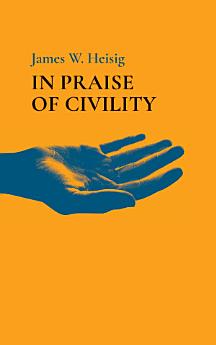In Praise of Civility
ธ.ค. 2021 · Wipf and Stock Publishers
eBook
136
หน้า
family_home
มีสิทธิ์
info
reportคะแนนและรีวิวไม่ได้รับการตรวจสอบยืนยัน ดูข้อมูลเพิ่มเติม
เกี่ยวกับ eBook เล่มนี้
Through telling stories about civility, this little book aims to provoke second thoughts about the effects of incivility on our lives and the lives of those around us. As short quips of moral outrage overtake more and more of our "civilized" conversations, the slow plod of thinking and acting civilly is easily left behind like a quaint and simpleminded distraction from the business of standing up for ourselves and our convictions. This is what the author wishes to turn on its head through examples of civility in action and the encouragement of "collective thinking" in which civility flowers.
เกี่ยวกับผู้แต่ง
James W. Heisig is a professor emeritus at Nanzan University in Nagoya, Japan, where he has spent the past forty-five years promoting the dialogue among philosophies and religions East and West at the Nanzan Institute for Religion and Culture. Widely known to hundreds of thousands of students for revolutionizing the study of the Chinese and Japanese writing systems, his published writings and translations have contributed greatly to the study of Japanese philosophy around the world.
ให้คะแนน eBook นี้
แสดงความเห็นของคุณให้เรารับรู้
ข้อมูลในการอ่าน
สมาร์ทโฟนและแท็บเล็ต
ติดตั้งแอป Google Play Books สำหรับ Android และ iPad/iPhone แอปจะซิงค์โดยอัตโนมัติกับบัญชีของคุณ และช่วยให้คุณอ่านแบบออนไลน์หรือออฟไลน์ได้ทุกที่
แล็ปท็อปและคอมพิวเตอร์
คุณฟังหนังสือเสียงที่ซื้อจาก Google Play โดยใช้เว็บเบราว์เซอร์ในคอมพิวเตอร์ได้
eReader และอุปกรณ์อื่นๆ
หากต้องการอ่านบนอุปกรณ์ e-ink เช่น Kobo eReader คุณจะต้องดาวน์โหลดและโอนไฟล์ไปยังอุปกรณ์ของคุณ โปรดทำตามวิธีการอย่างละเอียดในศูนย์ช่วยเหลือเพื่อโอนไฟล์ไปยัง eReader ที่รองรับ






